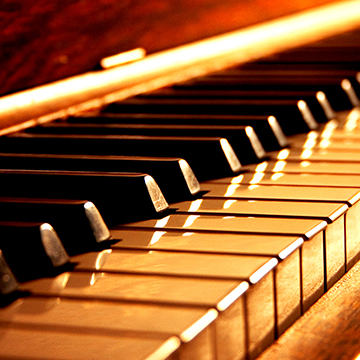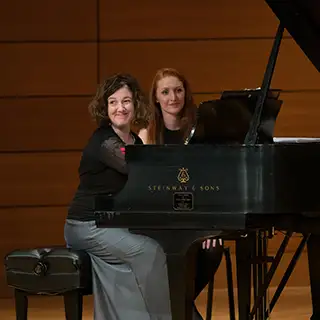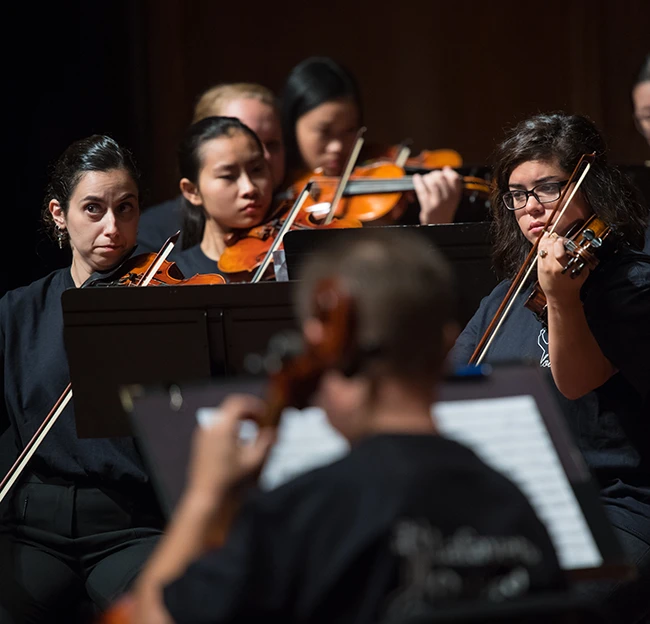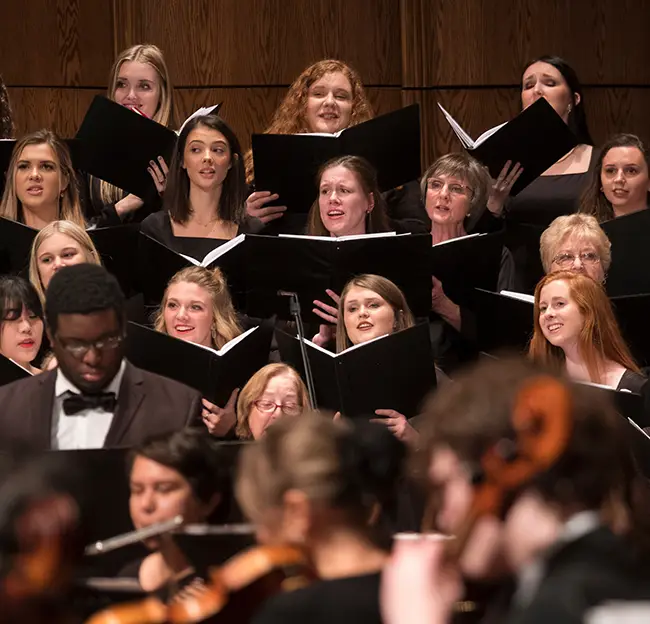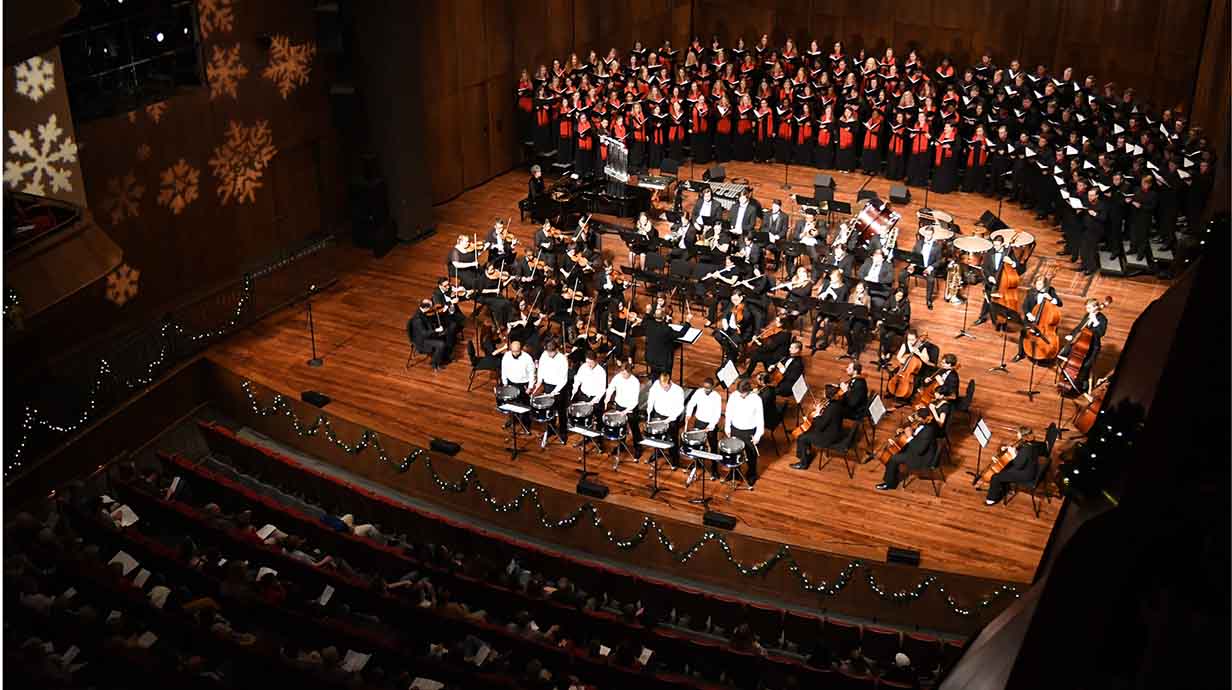
"The UM Music Department is a special place because everyone knows everyone, and you grow up alongside your peers. For the most part, you have the same professors throughout your college career which I like because they learn about you and how you learn."
Sofia Euyoque ('25)
B.M. in Music Education
About the Bachelor of Music in Music
The Department of Music in the College of Liberal Arts offers the B.M. in Music. Music students develop their full potential by participating in a wide range of musical experiences, including performing in the many and varied ensembles, receiving individual attention in studio lessons, and taking classes in the theory, history, and pedagogy of music.
Emphases
Students select one of two emphases:
- Music Education. Students prepare to teach at all levels of K-12 grade, with concentrations in keyboard, voice, or instrument. The degree program exceeds the minimum Mississippi Teacher Certification standards in vocal and instrumental music.
- Music Performance. Students prepare to become a professional musician or to attend graduate school. Students may concentrate in voice, keyboard, or instrument (woodwind, brass, string, or percussion).
Admission
The B.M. in Music degree has a competitive application process that is separate from the admission to the university. Visit the department website for more information about the audition process, including scheduling an in-person audition or submitting a video audition.
B.M. vs. B.A.
Students may choose between a Bachelor of Music in Music or a Bachelor of Arts in Music. Both degree programs require an audition.
- The Bachelor of Music in Music degree prepares students to become professional musicians and educators. B.M. students must choose one of the following emphases: music performance or music education, each with a concentration in instrumental, keyboard, or voice.
- The Bachelor of Arts in Music allows greater compatibility with other areas of study, and must be combined with a minor field of study (or double major). This well-rounded major is designed to provide the student with a broad liberal arts education as well as more specialized work in the applied area through a focus in either voice, keyboard, or instrument.
Majors are required to participate in four semesters of a major ensemble and four semesters of any ensemble. Ensembles include:
- Bands (Campus Band, Concert Band, Pride of the South, Sound of the 'Sip, Symphonic Band)
- Choirs (Concert Singers, Men's and Women's Glees, University Chorus)
- Opera Theatre
- University Orchestra
- Ole Miss Jazz
- African Drum and Dance Ensemble
- Percussion Ensemble and Steel Drum Orchestra
- Chamber ensembles
- UM Salsa Project
- Woodwind & Brass ensembles
The Value of a Music Degree
Music majors acquire a broad knowledge of music history, literature, and theory, as well as skill in performance, conducting, composition, and analysis. Our students explore a universal language that knows no barriers while learning specific strategies for advancing their musical craft. Careers related to music include music teacher, performer, accompanist, arranger, arts administrator, church musician, composer, conductor, instrument technician, music publisher, music retail store manager, and more!
On this Page…
Program Information
Degree
B.M. in Music
Emphases
Music Performance ;
Music Education
Required Credit Hours
124
Program Type
Major
Program Location
School
Duration
4 Years
Music Performance Emphases
Music Education Emphases
Video: Get to Know the Department of Music
Hear firsthand from students, faculty, and staff about the Music program.
Our Robust Scholarship Program
million in department scholarships are awarded to music majors.
What Can You Do With a Music Degree?
- Owner, Burnham Enterprises
- Director of Bands, Southaven
- Choral Director, Ocean Springs
- Director of Bands, Itawamba Community College
- Music Faculty, Arizona State University
- Music Faculty, Berklee College of Music
- National Trainer, Time to Teach
- Music Director/Conductor, "Cats"
- Professional Singer, Salzburg Opera Co.
- US Air Force Band
- Musical Director, Second City
- Project Coordinator, Academy of Motion Picture Arts and Sciences
- Music Engraving Manager, Warner Brothers
- Music Director, Cordova Presbyterian Church
- Piano Accompanist, New Orleans Rec Department/ Ballet Association Center for Dance
- President, MS Band Master's Association
Welcome to the College of Liberal Arts
As Coordinator of Student Recruitment for the College of Liberal Arts, I work with students, and their parents, who are interested in attending UM for their undergraduate degrees. I coordinate personalized visits to our departments, answer questions about the majors and programs in the CLA and handle all recruitment communications from the CLA. Please feel free to send me any questions you may have. It is my job to make sure you have everything you need to make an informed decision on where to spend your college career, and I hope it will be with the College of Liberal Arts at the University of Mississippi!
Annabelle Harris
Admissions Counselor
Future CLA Students

College of Liberal Arts Undergraduate Students
We invite future undergraduates to learn about the College of Liberal Arts, the value of the liberal arts education, our programs, career opportunities, and resources to help you succeed. You can also request a personalized degree sheet.
Next Steps
Explore Affordability
We have a variety of scholarships and financial aid options to help make college more affordable for you and your family.
Apply to the University of Mississippi
Are you ready to take the next step toward building your legacy?

